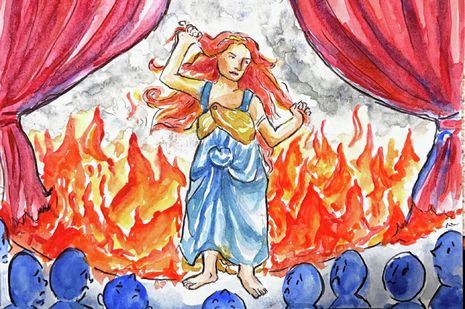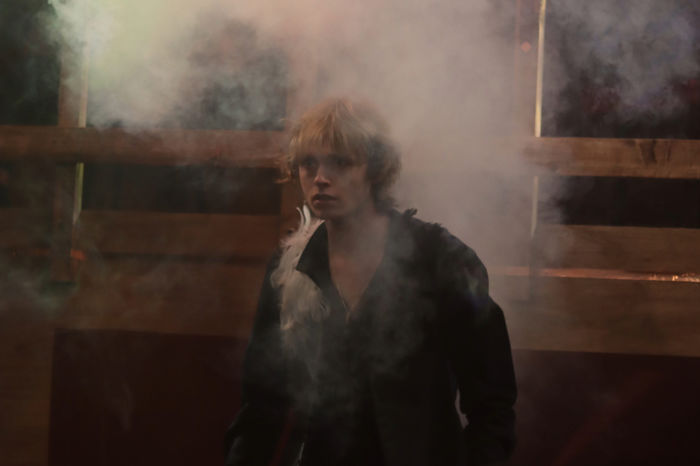We can never forget the classics
Eleanor Baldwin argues classical tales can still challenge us in ways we might not expect

Originally a community theatre project, the musical Hadestown has since won eight Tony awards, enjoying extended tours on international stages. The success of this musical reminds us of how the ancient myths continue to find new life on the contemporary stage. Although these myths originated long before the modern era, their malleability allows them to remain significant today. Motifs like love, death, hubris, and power connect audiences across time and place. I like to imagine someone all those years ago treading the same lines of an argument I recently had with my sister about Hadestown: did Orpheus ever have a chance to save Eurydice, or were they doomed from the outset?
Ancient myths provide an engaging framework for understanding contemporary social issues. Like Orpheus, the mythological figure of Cassandra, an ancient Greek prophetess, epitomises how enduring these stories can be. Bestowed with the gift of prophecy, yet fated to never be believed, Cassandra personifies the tension between the voices we give weight to and those we systematically dismiss. On stage, the figure was reimagined in 1908 in Lesia Ukrainka’s poetic drama ‘Cassandra’, which retold the classic myth from the perspective of the prophetess herself. Ukrainka’s drama was inherently an act of resistance, subverting a series of myths which has historically focused on male heroics. Later adapted by Live Canon in collaboration with the Ukrainian Institute London in 2022, the play brought alive a classic myth and extended its message into the present.
“Ukrainka’s drama was inherently an act of resistance”
By staging the myth in dramatic form, Ukrainka makes us feel the burden of silence; not just what Cassandra says, but how we, as the audience, hear her. After all, it is not the physical act of speech that fails Cassandra, but the reception of her words. The dramatic irony is abundant, considering an audience is likely to be well-versed in the classical story. This begs the question: is Cassandra’s audience itself the chorus that fails her? The enforced silence of the prophetess can be seen as a reflection of present-day repression, where uncomfortable social realities are often suppressed for the sake of ‘clean narratives’ – ones which are safe, palatable, and reflective of our zeitgeist’s status quo.
The myths of Orpheus and Cassandra are not the only adaptable stories; a myriad of other tales continue to be reshaped in order to confront questions of identity and power. Last year, the Pembroke Players adapted Euripides’ Bacchae to create a piece which explored queerness and self-repression. This play’s quasi-Pentheus, Joseph, was intoxicated by the unashamed freedom of the Dionysiac figure (a self-proclaimed god called Casey). Similarly, Jean Anoulih’s Antigone, performed at the Corpus Playroom, reinvigorated a classic Sophoclean tragedy. This play balanced tragedy and comedy to support an emotionally weighted exploration of Creon’s rule: is he a king we should condemn or sympathise with? It is this interweaving of classic myth and contemporary themes that makes these productions so illuminating. I can only wonder how Euripides and Sophocles themselves would have reacted to these adaptations – if only there was a newspaper for dead playwrights.
“We must continue the dialogue that surrounds these myths”
Seeing these myths brought alive on stage reminded me of my love for Classics. There is something neat in the way our reactions are shared across time: the gasp of the audience when Orpheus turns back; the frustration of a crowd who knew Cassandra to be right. To restage mythological figures is to present themes which still resonate and surely always will. So, we must continue the dialogue that surrounds these myths, while recognising their shifting contexts, so that we might challenge the idea that they only belong in the past.
There remains much that we can learn from them: from challenging the performance of repressed identity to legitimising the voices of Cassandras and giving them agency within their own narratives. Simply performing symbols of repression, like the words of the prophetess or the hidden desires of Pentheus, does not alone make a powerful statement. Rather, theatre must engage actively and in a nuanced way, deconstructing the faux-belief that these are issues we have ‘moved past’. The gap between the voices we amplify, and those we silence, remains as urgent as it was in antiquity. Failure lies both in the inadequate platform given to marginalised voices, and in their audience’s refusal to listen.
Our modern Cassandras are not on stage, highlighted by spotlights and clothed in star-spangled costumes, they are often far more hidden. They are people whose warnings are dismissed until the curtain falls down and the theatre is left empty. They are ignored and disbelieved, until Troy is burning and the Greeks have gone home.
 News / Judge Business School advisor resigns over Epstein and Andrew links18 February 2026
News / Judge Business School advisor resigns over Epstein and Andrew links18 February 2026 News / Gov grants £36m to Cambridge supercomputer17 February 2026
News / Gov grants £36m to Cambridge supercomputer17 February 2026 News / Union speakers condemn ‘hateful’ Katie Hopkins speech14 February 2026
News / Union speakers condemn ‘hateful’ Katie Hopkins speech14 February 2026 News / CUCA members attend Reform rally in London20 February 2026
News / CUCA members attend Reform rally in London20 February 2026 News / Right-wing billionaire Peter Thiel gives ‘antichrist’ lecture in Cambridge6 February 2026
News / Right-wing billionaire Peter Thiel gives ‘antichrist’ lecture in Cambridge6 February 2026










